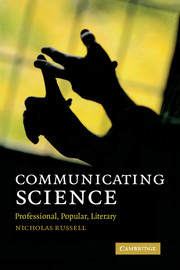Book contents
- Frontmatter
- Contents
- Introduction: What this book is about and why you might want to read it
- Prologue: Three orphans share a common paternity: professional science communication, popular journalism and literary fiction are not as separate as they seem
- Part I Professional science communication
- Part II Science for the public: what science do people need and how might they get it?
- Part III Popular science communication: the press and broadcasting
- Part IV The origins of science in cultural context: five historic dramas
- 15 A terrible storm in Wittenberg: natural knowledge through sorcery and evil
- 16 A terrible storm in the Mediterranean: controlling nature with white magic and religion
- 17 Thieving magpies: the subtle art of false projecting
- 18 Foolish virtuosi: natural philosophy emerges as a discipline but many cannot take it seriously
- 19 Is scientific knowledge ‘true’ or should it just be ‘truthfully’ deployed?
- Part V Science in literature
- Index
- References
19 - Is scientific knowledge ‘true’ or should it just be ‘truthfully’ deployed?
Published online by Cambridge University Press: 02 December 2010
- Frontmatter
- Contents
- Introduction: What this book is about and why you might want to read it
- Prologue: Three orphans share a common paternity: professional science communication, popular journalism and literary fiction are not as separate as they seem
- Part I Professional science communication
- Part II Science for the public: what science do people need and how might they get it?
- Part III Popular science communication: the press and broadcasting
- Part IV The origins of science in cultural context: five historic dramas
- 15 A terrible storm in Wittenberg: natural knowledge through sorcery and evil
- 16 A terrible storm in the Mediterranean: controlling nature with white magic and religion
- 17 Thieving magpies: the subtle art of false projecting
- 18 Foolish virtuosi: natural philosophy emerges as a discipline but many cannot take it seriously
- 19 Is scientific knowledge ‘true’ or should it just be ‘truthfully’ deployed?
- Part V Science in literature
- Index
- References
Summary
The true tale of Galileo and the Roman Catholic Church is as well known as the fictional Faust story. The great Italian astronomer used the newly invented telescope to reveal secrets of the Sun, planets, moon and stars, and to confirm the truth of Copernicus's earlier idea that the movements of bodies in the night sky are better explained by assuming that all the planets revolved round the Sun, rather than round the Earth. These ideas were opposed by the Catholic Church as heretical errors contradicting the Bible. As the most prominent exponent of the heliocentric view Galileo came up against the Papal Inquisition and was forced to recant his views on pain of torture and possibly death.
History has proved Galileo right and the Catholic Church wrong, making him a hero in the supposed struggle between reason and science, on the one hand, and religious superstition, on the other. But just as the Faust myth can be re-interpreted, so can Galileo's. He was indeed right, no one seriously denies that the Earth and other planets revolve round the Sun, but it is not that truth alone which determined his success. The role of cheer leader for the heliocentric universe fell to Galileo because of his skill with the politics of patronage and his clever use of presentational rhetoric.
While Galileo was scientifically right, the consequences of his discoveries were not value-free. At other times, when the consequences of science turn out to be morally undesirable, Galileo can be seen as a failure; someone who refused to take moral responsibility for the uses to which his knowledge was put. […]
- Type
- Chapter
- Information
- Communicating ScienceProfessional, Popular, Literary, pp. 237 - 244Publisher: Cambridge University PressPrint publication year: 2009



